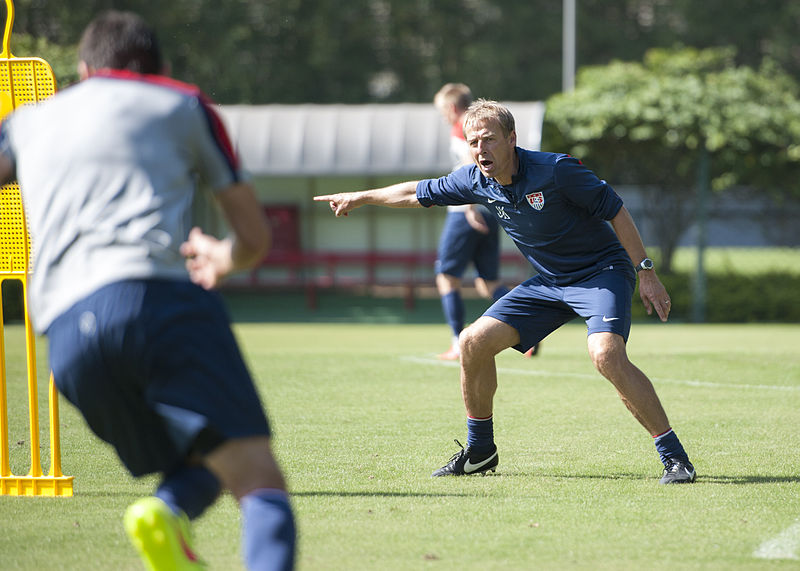Jurgen Klinsmann has been a controversial figure for U.S. Soccer ever since he was first appointed manager of the United States Men’s National Team in 2011.
His background and credentials as both player and manager were impressive: he was very successful in his time playing professionally, and came to the USA after a similarly successful stint as coach of the German national team, where he lead Die Mannschaft to the quarter-finals of the 2006 World Cup (they eventually fell to the Italian side that would win the tournament).
Because of his history and his potential to bring the USMNT to prominence in the world of football, Klinsmann was greeted with open, optimistic arms at his arrival.
However, he did not get off to a fantastic start when he took over for U.S. Soccer. In his first six games, Klinsmann lost four games, tied one, and lost another. He was criticised for many things, including the lackluster performances of the team, his own mentality, and his choice of roster. After all, Americans like to win. The next year started out better for Klinsmann and co., winning against Mexico, and even more stunningly, defeating a very strong Italian side. It looked as if Klinsmann’s tactics were starting to work. The USMNT was able to win some big games, defeating the second-ranked Germany at RFK in 2013, and taking the trophy of the 2013 CONCACAF Gold Cup while maintaining their winning streak.
Despite the team’s success during this period, however, many doubts about Klinsmann’s coaching still lingered.
First of all, Klinsmann likes to bring in as much talent to the team as he can, and he sometimes does this in unconventional ways; sometimes by means that aren’t always appreciated by those within U.S. Soccer. Since his time as the manager of the USMNT, Klinsmann has brought in players with dual citizenships from Germany, Mexico, Norway, and Iceland to play for the United States. In his 2014 World Cup roster, one quarter of his rostered players were born and raised in Germany. Klinsmann’s decision to recruit these players has been criticized, most notably by soccer pundit (and part-time rockstar) Alexi Lalas. Lalas argued that these players might not fight for the win in the name of the United States as much as American born players would. However the criticism did nothing to deter Klinsmann, who has another reason for playing these dual-citizens–namely, his problems with the MLS.
Klinsmann has said many times that the foundations and development of soccer in the United States aren’t yet up to par with development programs elsewhere, and are especially lagging behind those in Europe. By taking players who have risen through the ranks of European clubs, Klinsmann is getting players who, in his eyes, have had more solid training from a younger age. Furthermore, Klinsmann has been seemingly negative towards Major League Soccer, and emphasizes to his players the importance of playing abroad. He endorses transfers, such as Aron Johannsson’s to German first division side Werder Bremen, and pressures players to stay away from the MLS. In the last few years, however, many Americans who had previously been playing in Europe decided to return to the USA. Some of these players include Clint Dempsey, who left Tottenham for Seattle, and Michael Bradley, who transferred to Toronto FC from Roma in Italy. Klinsmann’s attitude towards the MLS has been criticised in relation to the building of a better soccer core for the USA. If all the players play abroad, then no one will be helping the development of talent within the U.S.
Last but not least is Klinsmann’s pre-World Cup 2014 debacle, where he managed to enrage the nation with his decision to leave Landon Donovan off the roster. In dropping Donovan, the longtime face of U.S. soccer, Klinsmann reinforced his belief that players should be chosen for what they can do, rather than what they have done. In pressers before the tournament, Klinsmann backed up his decision, and said that he thought that other players were fresher and better fit to play at the time.
Donovan’s name alone wasn’t enough to warrant his selection as a member of the USMNT World Cup roster.
Probably even more scandalous than the Donovan ordeal was the interview in which Klinsmann stated that the USMNT couldn’t win the World Cup.
Cue gasps from the entire nation.
This is not something that would ever go over well to the average American sports fan. The players and coaches representing the Red, White and Blue are expected to fight until the end, hoping, and even more importantly, believing, that they are capable of winning any competition in any sport.
Critics asked if a coach who thought the team was incapable of winning the tournament was the right man to be leading the team. In order to understand his statement, however, we must understand that it is fully cultural. Klinsmann, as a German, will state his mind as realistically as possible and in a style so blunt that it could… enrage an entire nation. What’s the point of believing that you can win if you know that it’s not possible? But I argue that this scandal, along with the others that have been discussed, have been overemphasized.
Should we support Jurgen Klinsmann?
I argue, yes.
Even in his controversial decisions are truths that in the end help the USMNT. For example, the dual-citizens who Klinsmann recruited are as much a part of the team as anyone else, and yes, they are strong. Julian Green, a German-American, scored the goal against Belgium in the 2014 World cup. John Brooks, also born and raised in Germany, scored the winning goal over Ghana which allowed the American side to advance out of the group of death in the World Cup. The argument that their being part of the team makes the team “less American” has nothing to do with the effectiveness of Klinsmann and the USMNT. These players have strengthened the team.
Furthermore, most people would agree that Klinsmann is correct in stating that the MLS is a step down from European soccer, and it is also not Klinsmann’s job to help the MLS. It’s his job to make the USMNT as good as it can be.The development of the MLS has to come from the construction of a different developmental process rather than from than the national team.
Next, Klinsmann’s decision to leave Donovan off the roster for the 2014 World Cup was controversial, yes, but was a case in which a coach’s judgment must be trusted and relied upon. In the end, it wasn’t a problem that Donovan wasn’t there. Klinsmann led the team through the group of death and put up a real fight against Belgium. These strong performances didn’t end after their exit from the tournament. They also beat Germany 2-1 in Cologne in October 2014, which further proved that they are able to compete against top teams.
In the end, Klinsmann will continue to make controversial decisions, say controversial things, and make some controversial tactical changes.
But to be honest, that’s what the USMNT needs.






Great read. I totally agree. Jermaine jones was recruited by Bob Bradley iirc so Klinsmann is not the first to bring in dual nationals, just the most successful at it.
Funny how the author forgets to mention the entire 2015 season, and the Gold Cup debacle. The 2015 Gold Cup was one of the worst debacles in USMNT history.
The GC was definitely a debacle but keep in mind the US had injuries to key players. The U.S. clearly missed JJ’s physicality shielding the backline. (As JK said, he’s the only US player opponents actually fear.) Jozy gets (deserved) criticism for his flaws but is our only striker with the strength andsize to breakdown physical defenses and provide his important hold up play. He clearly wasn’t 100% back from his latest hamstring injury. Cameron was out due to injury and would have been a big improvement at RB or CB. Let’s see what happens on 10/10.
Well, the USMNT just lost to Mexico, and the U-23 team will probably miss the Olympics. I told you Klinsmann was a rubbish coach!
I’m a bit late but just saw your reply.Nice Monday morning QBing, Andrew. Klinsmann got the player selection, tactics and subs spot on. The Mexican players were simply better. Way better. The national manager can not teach basic fundamental skills US players should have learned as children. Klinsmann has tried to bring an aggressive attacking system to the US, that all US fans crave, but the US players can not deliver against even half decent opponents. So we have a choice: give up and go back to bunker ball for a generation or 2 or take some lumps as we grow our talent from youth league to senior squad playing the “right way”. You can run for cover if you wish but I’ll take the latter.
Arena and Bradley won against mexico with similar talent. This was yet another tactical loss for klinsmann.